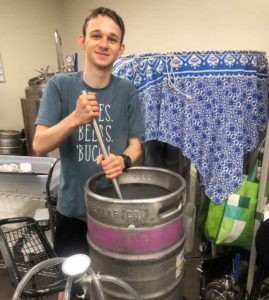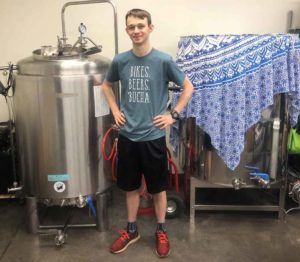
Ryan Pearce is currently a junior studying Fermentation Science and Technology in the Department of Food Science and Human Nutrition at Colorado State University. Pearce applied and received an internship this summer with Life’s a Buch Kombucha Company.
Where are you from?
A suburb of Chicago, Illinois.
What is your graduation year?
My plan is to graduate in 2023.
What attracted you to CSU?
Fermentation Science is a rare major and usually pretty small and obscure. I feel like CSU puts the program front and center. Getting to see the student run Ramskeller brewery and the facilities in the Gifford Building made a huge difference. There was an emphasis placed on my major that I hadn’t seen from other universities and that really made the decision for me.
Why did you choose to study your major?
Fermentation, as a field of study, perfectly combines art and science. Sometimes fermentation feels like a culinary art and sometimes it feels like chemistry. You have to be able to embrace both sides to be successful and I think that’s really interesting.
So far, what has been your favorite experience at CSU?
It isn’t really a specific moment, but it has to be the walk to campus. Such a beautiful view of the range, and it always makes the day a little better.
What has been your favorite part about your major?
Getting to meet other people with the same interest. Almost all of us have fermented at home as a hobby before coming to CSU so it’s amazing to share those experiences.
How/why did you apply for your internship? 
Fort Collins is filled with experienced breweries, kombucha companies and fermented food producers. An internship is a great opportunity to learn from these businesses in a very active and hands-on way. I applied to the internship for Life’s a Buch Kombucha Company because I saw the chance to learn from professional brewers in the field.
What does an average day at your internship look like?
We start the day by running a few analytical tests, taste testing the kombucha and having a discussion. The goal is to ensure that the product tastes how it should and is safe to consume. This is a perfect example of how the science and art of fermentation are intertwined. I need to be able to understand the concepts behind pH and brix measurements to conduct those analytics. But I also need to have a developed palate and experience to be able to properly evaluate flavor. We are constantly changing the addition of fruit and spices to adapt how our kombucha tastes. That aspect of production relies on more gut decisions or touch and feel then specific measurements. I need to be able to embrace both of those elements to do my job. The rest of the day varies based on our schedules but generally we will conduct the rest of the tasks necessary to produce kombucha. This includes brewing, transferring, flavoring, bottling, and packaging. We have a small team, so I get experience with every single one of these steps.
What is the biggest lesson that you will take home from this experience?
 Learning about the whole process. I have fermented kombucha at home, but I really didn’t know anything about turning it into a commercial product. All of the steps involved and the concepts behind those steps are really fascinating. I absorbed all of it and will certainly apply that knowledge in the future.
Learning about the whole process. I have fermented kombucha at home, but I really didn’t know anything about turning it into a commercial product. All of the steps involved and the concepts behind those steps are really fascinating. I absorbed all of it and will certainly apply that knowledge in the future.
What’s next? What do you hope to accomplish in the coming school year?
My junior year begins with a lot of in-depth degree specific classes. My goal for this semester is to delve into school and get as much as I can out of these classes. The hands-on experience I have gained is invaluable, but so is the insight I can gain from these courses.
What do you hope to accomplish in your career?
The fermented food and beverage industry has a lot of room to expand. I hope to work for a company that pushes fermentation into areas it has never gone before. There is a lot of unexplored territory, and a lot of products that most people have never heard of that could be huge successes. To be an instrumental part of that expansion would be a clear goal for me.
What advice do you have for incoming freshmen in your major?
Every aspect of this program can turn into a career. A lot of people enter a major with a specific job in mind, but a degree can teach you to do so many things. Start looking at job postings from day one, apply to internships and try anything even remotely related to the field. The search for a career that you love should start now to make sure you are prepared for the future.
The Department of Food Science and Human Nutrition is part of CSU’s College of Health and Human Sciences